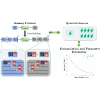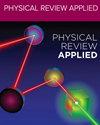通过零噪声外推法减少直流磁力测量中的误差
IF 3.8
2区 物理与天体物理
Q2 PHYSICS, APPLIED
引用次数: 0
摘要
零噪声外推法(ZNE)是一种通过噪声缩放和外推法估算量子电路期望值的技术,在量子计算领域得到了广泛的研究。我们研究了 ZNE 在量子传感领域的适用性。我们重点研究了使用拉姆齐协议的直流磁测量问题,结果表明,在斜率检测方案中使用 ZNE 后,灵敏度(最小可检测信号的意义)并没有提高。另一方面,幅度足够大的信号可以得到更精确的估计。我们的结果在各种噪声模型和 ZNE 协议设计选择(包括基于单量子比特和多量子比特的纠缠传感)中都是稳健的。本文章由计算机程序翻译,如有差异,请以英文原文为准。

Mitigating errors in dc magnetometry via zero-noise extrapolation
Zero-noise extrapolation (ZNE), a technique to estimate quantum circuit expectation values through noise scaling and extrapolation, is well studied in the context of quantum computing. We examine the applicability of ZNE to the field of quantum sensing. Focusing on the problem of dc magnetometry using the Ramsey protocol, we show that the sensitivity (in the sense of the minimum detectable signal) does not improve upon using ZNE in the slope detection scheme. On the other hand, signals of sufficiently large magnitude can be estimated more accurately. Our results are robust across various noise models and design choices for the ZNE protocols, including both single-qubit and multiqubit entanglement-based sensing.
求助全文
通过发布文献求助,成功后即可免费获取论文全文。
去求助
来源期刊

Physical Review Applied
PHYSICS, APPLIED-
CiteScore
7.80
自引率
8.70%
发文量
760
审稿时长
2.5 months
期刊介绍:
Physical Review Applied (PRApplied) publishes high-quality papers that bridge the gap between engineering and physics, and between current and future technologies. PRApplied welcomes papers from both the engineering and physics communities, in academia and industry.
PRApplied focuses on topics including:
Biophysics, bioelectronics, and biomedical engineering,
Device physics,
Electronics,
Technology to harvest, store, and transmit energy, focusing on renewable energy technologies,
Geophysics and space science,
Industrial physics,
Magnetism and spintronics,
Metamaterials,
Microfluidics,
Nonlinear dynamics and pattern formation in natural or manufactured systems,
Nanoscience and nanotechnology,
Optics, optoelectronics, photonics, and photonic devices,
Quantum information processing, both algorithms and hardware,
Soft matter physics, including granular and complex fluids and active matter.
 求助内容:
求助内容: 应助结果提醒方式:
应助结果提醒方式:


